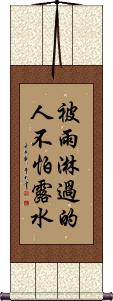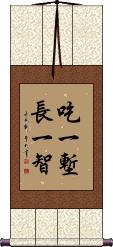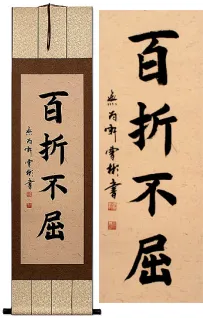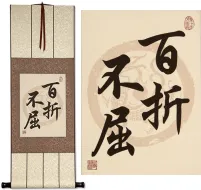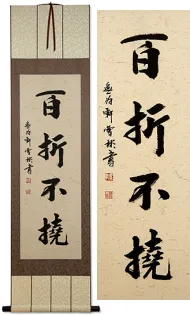Many custom options...
And formats...

Setbacks in Chinese / Japanese...
Buy a Setbacks calligraphy wall scroll here!
Personalize your custom “Setbacks” project by clicking the button next to your favorite “Setbacks” title below...
Undaunted After Repeated Setbacks
Persistence to overcome all challenges
百折不撓 is a Chinese proverb that means “Be undaunted in the face of repeated setbacks.”
More directly translated, it reads, “[Overcome] a hundred setbacks, without flinching.” 百折不撓 is of Chinese origin but is commonly used in Japanese and somewhat in Korean (same characters, different pronunciation).
This proverb comes from a long, and occasionally tragic story of a man that lived sometime around 25-220 AD. His name was Qiao Xuan, and he never stooped to flattery but remained an upright person at all times. He fought to expose the corruption of higher-level government officials at great risk to himself.
Then when he was at a higher level in the Imperial Court, bandits were regularly capturing hostages and demanding ransoms. But when his own son was captured, he was so focused on his duty to the Emperor and the common good that he sent a platoon of soldiers to raid the bandits' hideout, and stop them once and for all even at the risk of his own son's life. While all of the bandits were arrested in the raid, they killed Qiao Xuan's son at first sight of the raiding soldiers.
Near the end of his career, a new Emperor came to power, and Qiao Xuan reported to him that one of his ministers was bullying the people and extorting money from them. The new Emperor refused to listen to Qiao Xuan and even promoted the corrupt Minister. Qiao Xuan was so disgusted that in protest, he resigned from his post as minister (something almost never done) and left for his home village.
His tombstone reads “Bai Zhe Bu Nao” which is now a proverb used in Chinese culture to describe a person of strong will who puts up stubborn resistance against great odds.
My Chinese-English dictionary defines these 4 characters as “keep on fighting despite all setbacks,” “be undaunted by repeated setbacks,” and “be indomitable.”
Our translator says it can mean “never give up” in modern Chinese.
Although the first two characters are translated correctly as “repeated setbacks,” the literal meaning is “100 setbacks” or “a rope that breaks 100 times.” The last two characters can mean “do not yield” or “do not give up.”
Most Chinese, Japanese, and Korean people will not take this absolutely literal meaning but will instead understand it as the title suggests above. If you want a single big word definition, it would be indefatigability, indomitableness, persistence, or unyielding.
See Also: Tenacity | Fortitude | Strength | Perseverance | Persistence
One who is drenched in rain does not fear drops of dew
Each Time You Stumble and Fall, You Gain Experience and Wisdom
吃一塹長一智 is a Chinese proverb that means “Fall into a moat, and you will gain wisdom from the experience.”
It really suggests that the failures, troubles, frustrations, and setbacks that you encounter in your life are actually helping you to find wisdom. Some would also translate this proverb as “Learn from your mistakes” or “Learn from your experience.”
If you are studying Chinese, you will recognize the first character as “eat,” but in this case, it means to “experience” (as used in this proverb, it is suggesting that you have fallen into a moat and/or had a hard time crossing it).
Translated character by character, this whole proverb is, “Experience one moat, gain one wisdom/knowledge.”
Note: This can be pronounced in Korean, but it's not a commonly used phrase.
This in-stock artwork might be what you are looking for, and ships right away...
Gallery Price: $180.00
Your Price: $99.88
Gallery Price: $90.00
Your Price: $49.88
Gallery Price: $150.00
Your Price: $99.88
Not the results for setbacks that you were looking for?
Below are some entries from our dictionary that may match your setbacks search...
| Characters If shown, 2nd row is Simp. Chinese |
Pronunciation Romanization |
Simple Dictionary Definition |
百折不撓 百折不挠 see styles |
bǎi zhé bù náo bai3 zhe2 bu4 nao2 pai che pu nao hyakusetsufutou / hyakusetsufuto ひゃくせつふとう |
More info & calligraphy: Undaunted After Repeated Setbacks(yoji) indefatigability; indomitableness |
不怕 see styles |
bù pà bu4 pa4 pu p`a pu pa |
fearless; not worried (by setbacks or difficulties); even if; even though |
幾經 几经 see styles |
jǐ jīng ji3 jing1 chi ching |
to go through numerous (setbacks, revisions etc) |
爛尾 烂尾 see styles |
làn wěi lan4 wei3 lan wei |
(of a construction project etc) unfinished; derailed (due to critical setbacks) |
蹭蹬 see styles |
cèng dèng ceng4 deng4 ts`eng teng tseng teng |
(literary) to encounter setbacks; to have bad luck |
好事多磨 see styles |
hǎo shì duō mó hao3 shi4 duo1 mo2 hao shih to mo |
the road to happiness is strewn with setbacks (idiom) |
屢敗屢戰 屡败屡战 see styles |
lǚ bài lǚ zhàn lu:3 bai4 lu:3 zhan4 lü pai lü chan |
to keep on fighting despite continual setbacks (idiom) |
開弓沒有回頭箭 开弓没有回头箭 see styles |
kāi gōng méi yǒu huí tóu jiàn kai1 gong1 mei2 you3 hui2 tou2 jian4 k`ai kung mei yu hui t`ou chien kai kung mei yu hui tou chien |
lit. once you've shot the arrow, there's no getting it back (idiom); fig. once you started something, there's no turning back; to have to finish what one started; to be determined to reach one's goals in spite of setbacks |
The following table may be helpful for those studying Chinese or Japanese...
| Title | Characters | Romaji (Romanized Japanese) | Various forms of Romanized Chinese | |
| Undaunted After Repeated Setbacks | 百折不撓 百折不挠 | hyaku setsu su tou hyakusetsusutou hyaku setsu su to | bǎi zhé bù náo bai3 zhe2 bu4 nao2 bai zhe bu nao baizhebunao | pai che pu nao paichepunao |
| One who is drenched in rain does not fear drops of dew | 被雨淋過的人不怕露水 被雨淋过的人不怕露水 | bèi yǔ lín guò de rén bù pà lù shuǐ bei4 yu3 lin2 guo4 de ren2 bu4 pa4 lu4 shui3 bei yu lin guo de ren bu pa lu shui | pei yü lin kuo te jen pu p`a lu shui pei yü lin kuo te jen pu pa lu shui |
|
| Each Time You Stumble and Fall, You Gain Experience and Wisdom | 吃一塹長一智 吃一堑长一智 | chī yí qiàn, zhǎng yí zhì chi1 yi2 qian4 zhang3 yi2 zhi4 chi yi qian zhang yi zhi chiyiqianzhangyizhi | ch`ih i ch`ien chang i chih chihichienchangichih chih i chien chang i chih |
|
| In some entries above you will see that characters have different versions above and below a line. In these cases, the characters above the line are Traditional Chinese, while the ones below are Simplified Chinese. | ||||
Successful Chinese Character and Japanese Kanji calligraphy searches within the last few hours...

